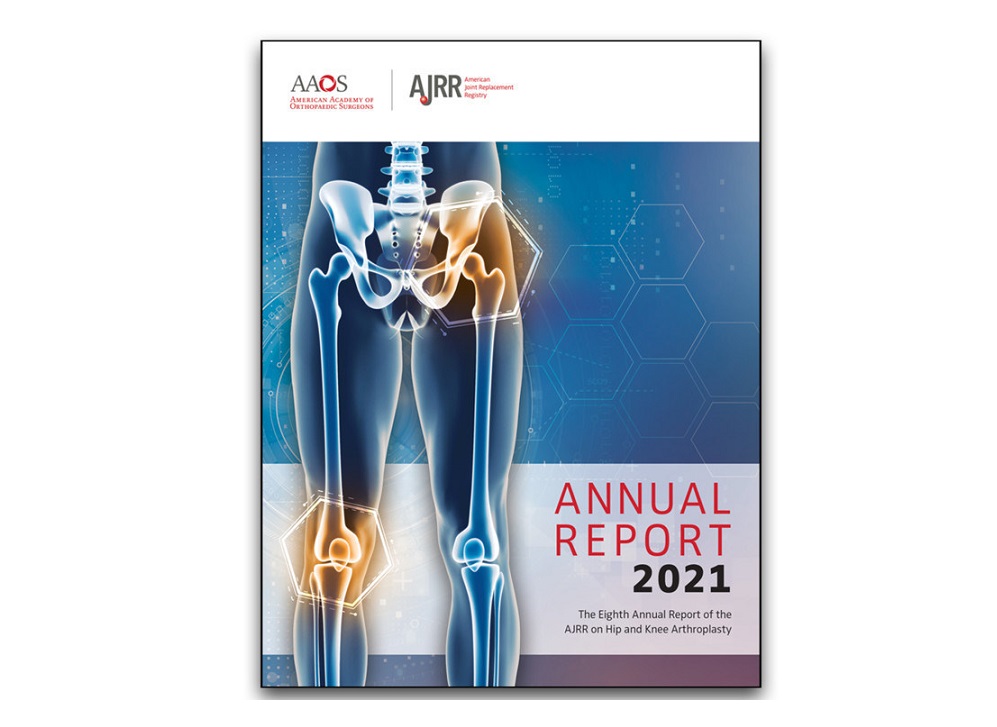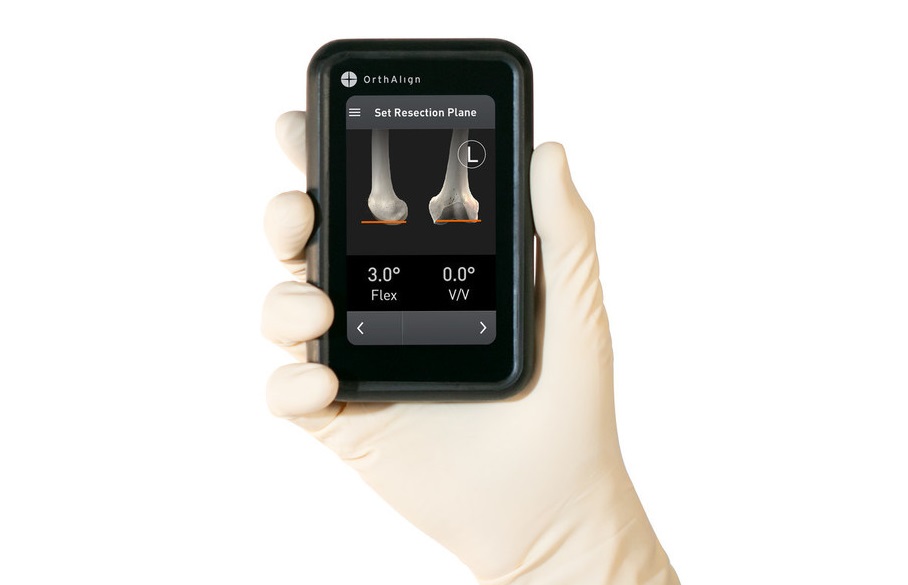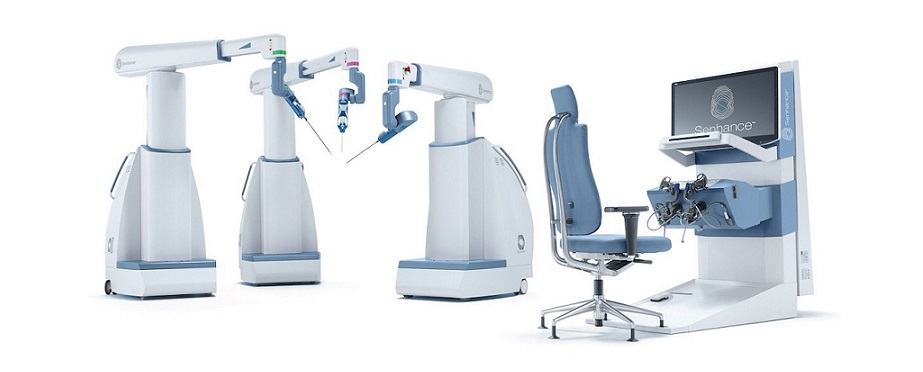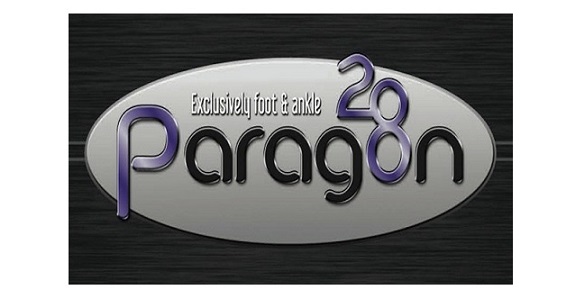Data shows the length of stay following hip and knee arthroplasty continues to decrease, provides insights for orthopaedic surgeons
ROSEMONT, Ill., Nov. 12, 2021 /PRNewswire/ –The American Joint Replacement Registry (AJRR), the cornerstone of the American Academy of Orthopaedic Surgeons (AAOS) Registry Program, released its 2021 Annual Report on hip and knee arthroplasty procedural trends, and patient outcomes today at the American Association of Hip and Knee Surgeons’ (AAHKS) 2021 Annual Meeting. Despite the disruption to the delivery of joint replacement care during the initial impact of the COVID-19 pandemic (March through May 2020), procedures rebounded to historic averages by June 2020. Even with the temporary decline in procedures, the report demonstrates an overall cumulative procedural volume growth of 18.3% compared to the previous year and includes findings from 2,244,587 hip and knee arthroplasty procedures performed between 2012 and 2020.
“The ability to return to normal procedural volume rates just a few months after the COVID-19 pandemic began is a testament to the commitment and resiliency of healthcare institutions, clinicians and patients,” said Bryan D. Springer, MD, FAAOS, chair of the AJRR Steering Committee. “While we are experiencing unprecedented times in healthcare and continue to navigate the challenges of the pandemic, the AJRR remains committed to the growth and expansion of the registry to paint a more complete picture of our patient population. Through increased participation and a successful integration of Medicare claims data, we are providing orthopaedic surgeons, hospitals and stakeholders with actionable data, insights and trends to improve the lives of millions of Americans who suffer from hip and knee arthritis.”
AJRR is the largest orthopaedic registry in the world based on annual procedures submitted, and the 2021 AJRR Annual Report marks the eighth annual report. With the collection and reporting of U.S. hip and knee arthroplasty data, the report aims to provide valuable information to orthopaedic surgeons, hospitals, ambulatory surgery centers, private practices, device manufacturers, payers, and most importantly patients. The 2021 report represents over 2.2 million hip and knee procedures from over 1,150 hospitals, ambulatory surgery centers (ASCs), and private practice groups submitting data from across all 50 states and the District of Columbia.
James A. Browne, MD, FAAOS, chair of the AJRR Publications Subcommittee and editor of AJRR Publications added: “This year’s AJRR Annual Report provides the most comprehensive picture to date of patterns of hip and knee arthroplasty practice and outcomes in the United States. For the first time this year, cumulative percent revision curves were produced with a diagnosis-specific endpoint examining revision due to infection for total knee arthroplasty (TKA) and revision due to periprosthetic fracture for total hip arthroplasty (THA) patients over 65 years of age. The registry continues to use more sophisticated and detailed survivorship curves, including device-specific cumulative revision stratified by bearing and fixation type, in addition to utilizing Centers for Medicare & Medicaid Services (CMS) data.”
Additional findings from the 2021 AJRR Annual Report include:
- Device-specific revision analyses showed that all included hip device constructs had a cumulative percent revision of less than 2.8% at one year and less than 4.7% at final follow up for each respective device. All knee device constructs included in analysis had a cumulative percent revision of less than 2.5% at three years and less than 3.7% at final follow up for each respective device.
- The use of cement for femoral component fixation is slowly increasing for both elective primary THA as well as arthroplasty for femoral neck fracture, and cementless fixation shows a statistically significant reduction in early revision due to periprosthetic fracture, compared to cementless fixation in elective primary THA patients over 65 years of age.
- While cemented fixation for TKA still predominates, the report shows that cementless fixation continues to increase and was associated with significantly less revision due to infection in elective primary TKA patients over 65 years of age.
- For both TKA and THA procedures, postoperative length of stay continues to decrease.
Enhanced Registry capabilities offerings and include:
- Additional opportunities for sites to track performance measurements and use Registry data in national quality improvement (QI) programs.
- A 39% increase in sites reporting patient-reported outcome measures (PROMs), compared to the previous year, through continued support of the RegistryInsights® PROM platform and partnerships with third-party vendors with the expanded Authorized Vendor Program.
- Peer-reviewed publications and presentations based on AJRR Registry data.
To read and download the complete 2021 report, visit the AJRR website. Slides with figures and data tables as featured in the report are also available.
AAOS Registry Program
The AAOS Registry Program’s mission is to improve orthopaedic care through the collection, analysis, and reporting of actionable data. The American Joint Replacement Registry (AJRR), the Academy’s hip and knee replacement registry, is the cornerstone of the AAOS’s Registry Program, and the world’s largest national registry of hip and knee joint replacement data by annual procedural count, with more than 2.4 million procedures contained within its database. Additional registries include the Fracture & Trauma Registry, the Musculoskeletal Tumor Registry (MsTR), the Shoulder & Elbow Registry (SER), and the American Spine Registry (ASR), a collaborative effort between the American Association of Neurological Surgeons (AANS) and the AAOS.
About the AAOS
With more than 39,000 members, the American Academy of Orthopaedic Surgeons is the world’s largest medical association of musculoskeletal specialists. The AAOS is the trusted leader in advancing musculoskeletal health. It provides the highest quality, most comprehensive education to help orthopaedic surgeons and allied health professionals at every career level best treat patients in their daily practices. The AAOS is the source for information on bone and joint conditions, treatments, and related musculoskeletal health care issues, and it leads the health care discussion on advancing quality.
Follow the AAOS on Facebook, Twitter, LinkedIn, and Instagram.
SOURCE American Academy of Orthopaedic Surgeons







